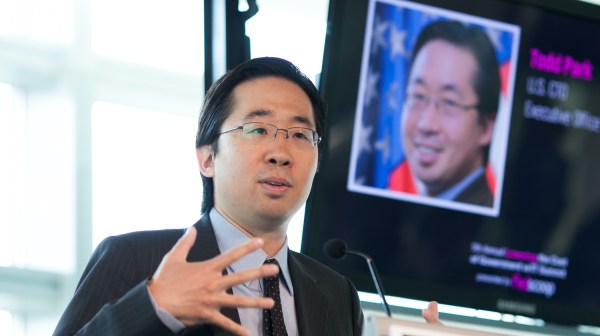 U.S. CTO Todd Park (File photo: Institute of Medicine)
U.S. CTO Todd Park (File photo: Institute of Medicine)The federal government is witnessing the emergence of a “data-powered revolution in health care,” thanks in part to the money distributed by the Recovery Act, according to U.S. Chief Technology Officer Todd Park.
In a post on the White House blog, which was accompanied by a blog post by Kathleen Sebelius, secretary at the Health and Human Services Department, Park said digital data, new data-driven tools and new payment policies that reward improved health care are enhancing the quality and value of care overall.
“We are beginning to see what happens when you unleash the power of American innovators and data to transform health care for the better from the ground up,” Park said. “It’s no surprise to the doctors, hospitals, patients and entrepreneurs who have been working so hard to improve health care. But it is, indeed, great news for the nation.”
Both Park and Sebelius referenced a recent New York Times article by Thomas Friedman that discussed the rise of information technology in health care as one of the benefits of the Affordable Care Act.
“Today, we are focused on driving a smarter health care system focused on the quality – not quantity – of care,” Sebelius said. “The health care law includes many tools to increase transparency, avoid costly mistakes and hospital readmissions, keep patients healthy, and encourage new payment and care delivery models, like Accountable Care Organizations. Health information technology is a critical underpinning to this larger strategy.”
Sebelius wrote on two key aspects of the Affordable Care Act and its impact on technology:
Mobilizing the use of health information technology: Sebelius pointed out that more than half of all doctors and other eligible providers – and nearly 80 percent of hospitals – are using electronic health records to improve care, a 200 percent increase since 2008.
Government data as fuel for innovation: Earlier this month, the administration released unprecedented data about what hospitals across the country charge for the 100 most common Medicare inpatient stays, which can vary widely. In May, the administration announced a $1 billion challenge to help jump-start innovative projects that test creative ways to deliver high-quality medical care and lower costs to people enrolled in Medicare and Medicaid.






